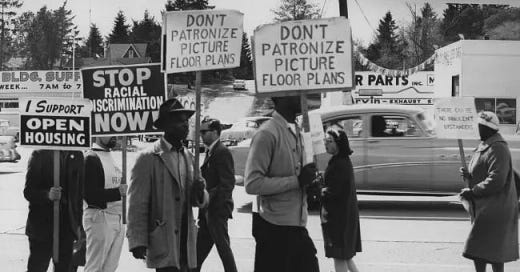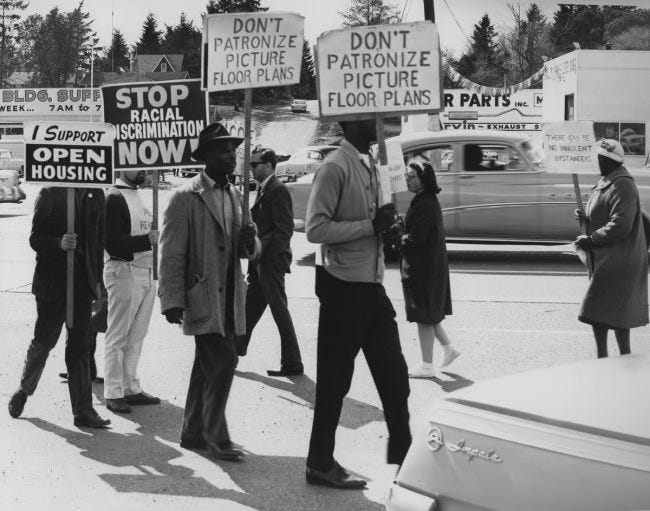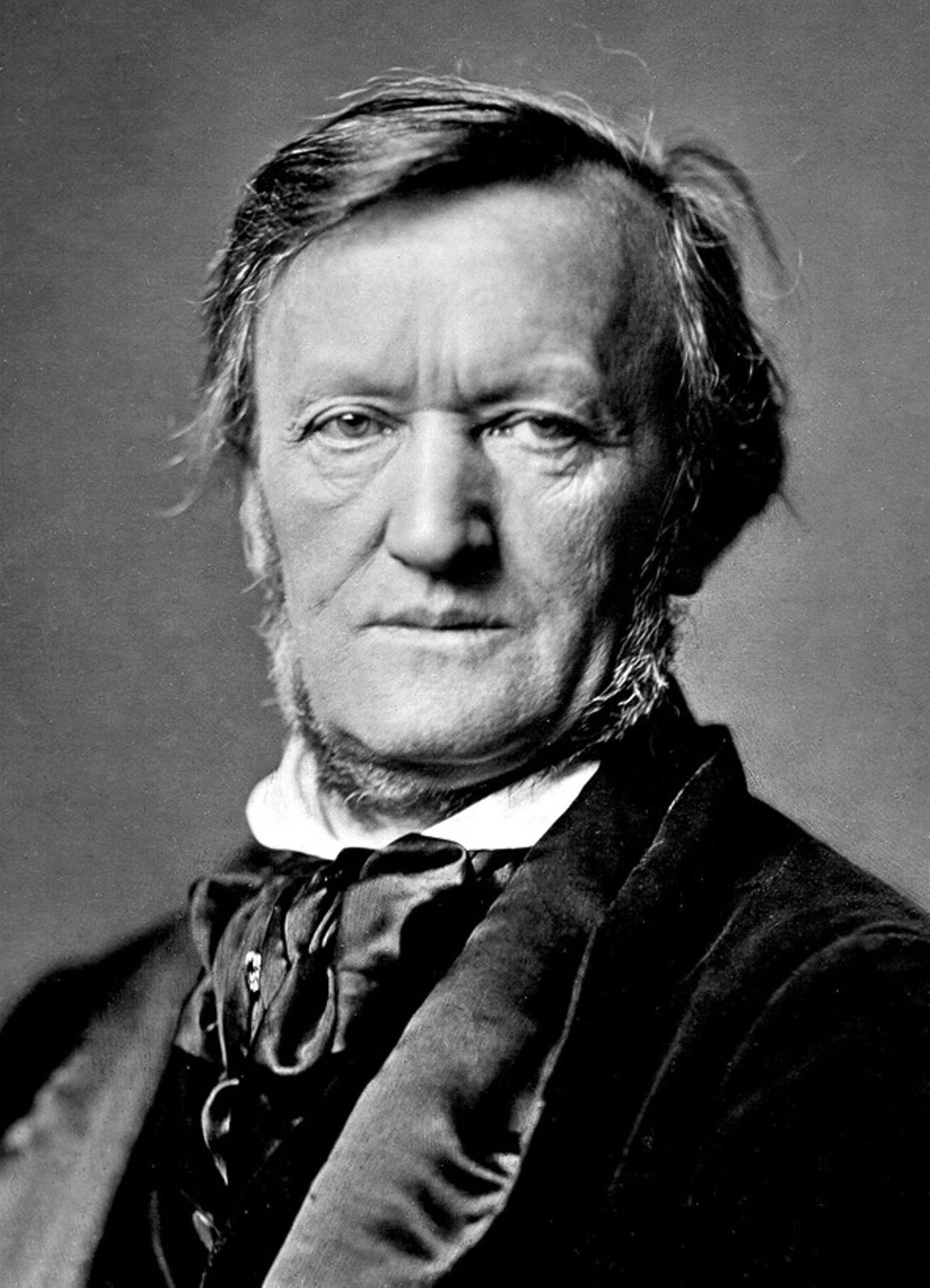This Day in Legal History: Fair Housing Act
On this day in legal history, April 11, 1968, President Lyndon B. Johnson signed the Civil Rights Act of 1968 into law, a pivotal expansion of civil rights protections in the United States. Commonly referred to as the Fair Housing Act, the legislation was enacted just days after the assassination of Dr. Martin Luther King Jr., whose legacy of nonviolent activism heavily influenced its passage. The law made it illegal to discriminate in the sale, rental, financing, or advertising of housing based on race, color, religion, or national origin.
It aimed to dismantle the systemic barriers that had long segregated American cities and suburbs, including redlining, racially restrictive covenants, and other discriminatory practices. Title VIII of the Act directly addressed these inequities and empowered the federal government to enforce fair housing standards for the first time. Though political resistance to housing integration had stalled similar legislation for years, the national mourning following Dr. King's death shifted public and congressional sentiment.
Johnson, in a nationally televised address, described the signing as a tribute to Dr. King's life and a necessary step toward realizing the full promise of civil rights in America. Subsequent amendments expanded protections to include sex, disability, and familial status, making the Fair Housing Act one of the most comprehensive civil rights laws on the books. Enforcement mechanisms, however, remained a challenge, and litigation over housing discrimination has continued into the present day.
The law has been central to major legal battles over zoning laws, gentrification, and access to affordable housing. It also laid the groundwork for subsequent legislation aimed at combating economic and racial segregation. While the Act did not instantly eliminate housing discrimination, it marked a legal turning point that recognized the home as a critical site of equality and opportunity.
A small team from the Department of Government Efficiency (DGE), created under Elon Musk’s initiative to reduce government spending and staffing, has arrived at the Federal Deposit Insurance Corp. (FDIC), according to an internal email from the agency. While the team is working with FDIC leadership to identify internal efficiencies, it does not have access to sensitive or confidential bank data, including resolution plans, deposit insurance records, or examination materials. The FDIC emphasized that the DGE operatives are full-time federal employees working under formal interagency agreements and have not sought access to confidential information.
DGE has previously drawn concern from industry participants during its visit to the Consumer Financial Protection Bureau due to fears over data exposure. The FDIC oversees highly sensitive information about major U.S. banks and their failure plans, which regulators rely on during crises. The number and identity of DGE team members at the FDIC have not been disclosed, and the agency declined to comment further.
The agency is also preparing for staff reductions, following the Trump administration’s deferred resignation program that has already led to the loss of 500 FDIC employees. Additional buyouts and formal layoffs are expected soon. The timing of DGE’s involvement comes as global markets react to new tariffs announced by President Trump, prompting concerns from former officials about weakening regulators’ ability to respond to potential financial instability.
DOGE Arrives at FDIC but Doesn't Have Access to Bank Data (2)
At least three major law firms—Kirkland & Ellis, Latham & Watkins, and Simpson Thacher & Bartlett—are in talks with the Trump administration to reach a joint agreement that would commit over $300 million in pro bono services to causes favored by the White House. The potential deal is also intended to resolve federal investigations into the firms’ diversity programs, which the administration has scrutinized for alleged discriminatory practices. If finalized, the arrangement would bring the total pledged in pro bono services from various firms to at least $640 million.
President Trump, speaking at a Cabinet meeting, hinted that a handful of firms remain in negotiations, emphasizing that many firms have already paid significant sums or made concessions. He stated that he expects lawyers from participating firms to assist with policy efforts such as implementing tariffs and expanding coal mining.
The administration has previously targeted several firms with executive orders for representing causes or clients viewed as oppositional to Trump’s agenda. These orders have included punitive measures such as revoking security clearances and restricting federal access. Some firms—like Perkins Coie and Jenner & Block—have successfully blocked these actions in court, while others like Paul Weiss settled by agreeing to pro bono contributions. Firms such as Skadden and Milbank preemptively negotiated similar deals.
Trump Talks Deal With Three Massive Law Firms as Others Fight
A U.S. immigration judge is set to rule today on whether Mahmoud Khalil, a Palestinian student activist at Columbia University, can be deported. Khalil, who holds Algerian citizenship and became a lawful U.S. permanent resident last year, was arrested last month at his New York City apartment and transferred to an immigration jail in rural Louisiana. Secretary of State Marco Rubio has called for Khalil’s removal under the 1952 Immigration and Nationality Act, arguing that his presence in the U.S. poses foreign policy risks due to his role in pro-Palestinian campus protests.
Rubio’s letter to the court claims Khalil was involved in “antisemitic protests and disruptive activities” but does not accuse him of any crimes. Instead, Rubio argues the government can revoke legal status based solely on speech or associations if deemed harmful to U.S. interests. Khalil’s attorneys say the case is an attempt to punish constitutionally protected speech and have called the letter politically motivated and authoritarian in tone.
They are requesting to subpoena and depose Rubio as part of their defense. The immigration court hearing the case operates under the Department of Justice and is separate from the federal judiciary. Khalil is also suing in a New Jersey federal court, alleging that his arrest, detention, and transfer far from his legal team and family were unconstitutional.
US immigration judge to decide whether Columbia student Mahmoud Khalil can be deported | Reuters
President Trump signed a bill nullifying a revised IRS rule that would have broadened the definition of a “broker” to include decentralized cryptocurrency exchanges, or DeFi platforms. The rule, finalized in the final weeks of the Biden administration, was part of a broader IRS effort to tighten crypto tax enforcement and was rooted in the 2021 Infrastructure Investment and Jobs Act. It would have required DeFi platforms to report user transactions to both the IRS and the users themselves.
The crypto industry strongly opposed the rule, arguing that DeFi platforms do not function like traditional brokers and lack access to user identities, making compliance impossible. Centralized exchanges like Coinbase and Kraken, by contrast, already meet these reporting requirements as intermediaries. Both the House and Senate voted in March to repeal the IRS rule through the Congressional Review Act, which allows Congress to overturn recent federal regulations with a majority vote.
Trump, who has positioned himself as a pro-crypto candidate, had campaigned on promises to support digital asset innovation. Since taking office, he has formed a federal cryptocurrency working group and signed an executive order to establish a national bitcoin reserve.
Trump signs bill to nullify expanded IRS crypto broker rule | Reuters
This week’s closing theme takes us back to April 13, 1850, when Richard Wagner’s opera Lohengrin premiered in Weimar under the baton of his friend and supporter, Franz Liszt. Wagner, one of the most influential and controversial figures in classical music, was then in political exile, and unable to attend the debut of what would become one of his most iconic works. Known for his revolutionary approach to opera—melding music, drama, and mythology—Wagner crafted Lohengrin as a sweeping, mystical tale of a knight of the Holy Grail who arrives in a swan-drawn boat to defend the innocent Elsa of Brabant. The opera’s shimmering textures, leitmotif-driven score, and spiritual overtones would set the stage for his later monumental works like Tristan und Isolde and the Ring Cycle.
Lohengrin remains best known for its third-act bridal chorus—“Here Comes the Bride”—but the opera’s deeper themes of identity, trust, and the cost of forbidden questions give it lasting emotional and philosophical weight. Set in a quasi-medieval world laced with mystery, the opera tells of a hero who must depart the moment his name is asked, leaving love suspended in silence. Wagner’s orchestration in Lohengrin is luminous and patient, often evoking shimmering water and distant prophecy, with long-breathed phrases that seem to float above time.
As a closing theme for this week, Lohengrin invites reflection—on belief, on leadership, and on how history so often pivots on names, silence, and the tension between loyalty and doubt. Its premiere on April 13th marks not only a moment in Wagner’s evolution as a composer but also a cultural point of departure, where German Romanticism began leaning toward something darker and more transcendental. We end the week, then, with the slow unfurling of Lohengrin’s prelude: a gentle, ascending shimmer that begins almost imperceptibly, and rises—like the swan on the river—toward the unknown.
This week, we close with the prelude to Lohengrin by Richard Wagner—music of undeniable beauty from a composer whose legacy includes both brilliance and deeply troubling beliefs. We share it for its artistry, not its ideology. Without further ado, Richard Wagner’s Lohengrin, the prelude. Enjoy!















Share this post